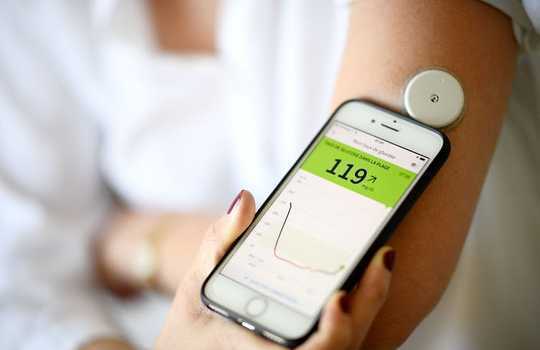 A woman with diabetes monitors her glycemia on the eighth day of a strict lockdown in France aimed at curbing the spread of COVID-19. FRANCK FIFE/AFP via Getty Images
A woman with diabetes monitors her glycemia on the eighth day of a strict lockdown in France aimed at curbing the spread of COVID-19. FRANCK FIFE/AFP via Getty Images
Can watching your blood sugar help fight COVID-19?
Sugar is not only something that sweetens our food. It is also something that is an essential part of the proteins that make up our bodies.
That led me to believe, as I wrote in the Journal of Medical Virology, that control of blood glucose by diet and exercise, as well as better control of blood sugar in diabetics, especially when ill with COVID-19, may possibly help control the severity of the disease and even its spread.
I have worked in the field of breast cancer for many years, and my colleagues and I have been trying to use a drug called hydroxychloroquine in clinical trials. The goal: reduce the number of breast cancer cells in the bone marrow and prevent their re-emergence many years later to cause recurrence – what’s called tumor dormancy.
Get The Latest By Email
You probably have heard a lot about the antimalarial drug hydroxychloroquine in recent months as it has been suggested as a treatment for COVID-19. No conclusive evidence to date proves that hydroxychloroquine is effective. But, it turns out, hydroxychloroquine might be able tolower blood sugar like metformin.
Colleagues of mine have shared that many of their COVID-19 patients not only had diabetes but some were undiagnosed diabetics as well.
Knowing the drug’s potential to lower blood sugar, coupled with reports of high blood sugar in COVID-19 patients, led me to put both together to try to explain some things about COVID-19 and how blood sugar may interact with the virus.
Blood sugar and how the virus enters cells
The new coronavirus infects cells by attaching to the surface through a receptor called the angiotensin converting enzyme 2, or ACE2. Both the ACE2 and the virus need sugar molecules bound to their protein for this to work properly.
My idea, which I have described in a peer-reviewed article in the Journal of Medical Virology, is that COVID-19 infection and its severity is influenced by the concentration of sugar-coated virus and the concentration of sugar-coated ACE2 receptors in the lung tissues. The degree and control of the lungs’ immune response may also depend on how much sugar is attached to virus’s spike protein approximately eight to 10 days after symptoms start, which may vary depending on your age and sex
Researchers already know that people with diabetes are more vulnerable to COVID-19. What is unusual is that when I talked to physicians around the country taking care of COVID-19 patients, they told me that a lot of their patients in the hospital not only had diabetes and prediabetes but others had high blood sugar, without being aware of it. There is a recent report from Wuhan, China, that finds that is true there as well. COVID-19 patients with Type 2 diabetes have poor glucose control.
People with SARS - which is related to the new coronavirus – seem to get high blood sugar temporarily when they get infected as well.
This makes sense because there are a lot of ACE2 receptors on the so-called islet cells of the pancreas. These are the cells that make insulin – which is critical for controlling blood sugar. If the virus infects these cells, then they stop making insulin and you can get a temporary diabetes with COVID-19.
High blood sugar increases the number of sugar-coated ACE2 receptors in the lungs of diabetic mice. So not only are the number of receptors greater, but also there are more sugars attached to them. This makes it easier for the virus to infect cells. When there is more insulin, or through diet or exercise, there is less sugar, so there are fewer ACE2 receptors and less sugar on each one, and this may reduce the amount of virus getting into the cell.
That suggests that a high blood sugar test called hemoglobin A1c – which can be used even in those without diabetes or prediabetes – could be used as a marker for patients at risk for COVID-19 disease. In fact, 3.8% of the U.S. population has a high A1c.
How is hydroxychlorquine involved?
Hydroxychloroquine may work by blocking processes in the cell that add sugars to proteins. This the opposite of what high blood sugar seems to do. This would theoretically impede the virus from interacting with its receptor and modulate the inflammatory response to the virus.
It is unclear whether hydroxychloroquine will work for everyone, or even in a small group of patients. While the medical community awaits clinical trials to tell us once and for all if hydroxychloroquine works in COVID-19, the interesting thing to me is that this debate may have brought us a possible hypothesis as to why high blood sugar may make the disease worse, and possibly what to do about it.
A lot of new drugs and theories are emerging about COVID-19 and the science is advancing rapidly. It is important to have theories explaining what you are seeing clinically and scientifically to see if they fit – and then test them. If not, try a variation. It is the thinking and the testing that will allow us to beat COVID-19.
About The Author
Adam M. Brufsky, Professor of Medicine, University of Pittsburgh
This article is republished from The Conversation under a Creative Commons license. Read the original article.
books_health







